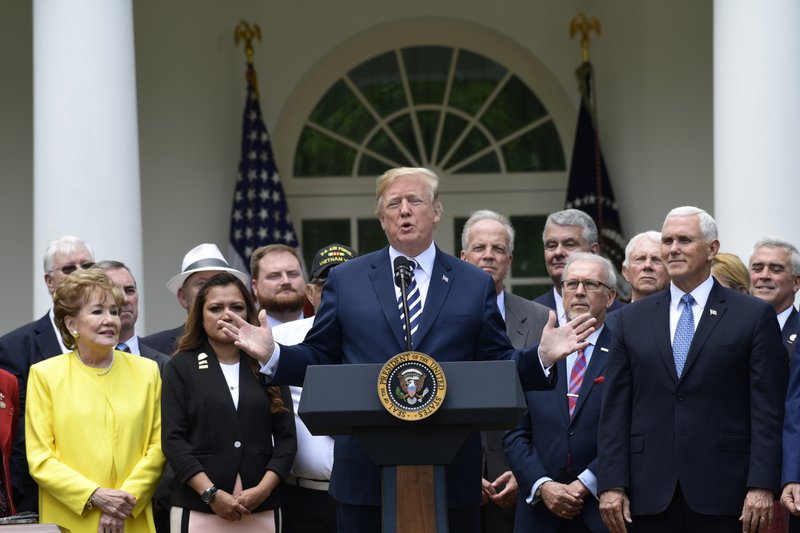WASHINGTON -- President Donald Trump signed a bill into law Wednesday that will give veterans more freedom to see doctors outside the troubled Veterans Affairs system, a major shift aimed at reducing wait times and improving care by steering more patients to the private sector.
At a Rose Garden event at the White House, Trump praised the legislation as fulfilling his pledge to fix the Department of Veterans Affairs by bringing accountability and providing private care to veterans whenever they feel unhappy with government-run health care.
"All during the campaign I'd go out and say, 'Why can't they just go see a doctor instead of standing in line for weeks and weeks and weeks?' Now they can go see a doctor," he said.
The $51 billion plan, which would also expand a VA caregivers program to cover families of veterans of all eras, cleared the Senate on a 92-5 vote last month. The House approved it on a 347-70 vote.
The legislation will give veterans access to private care when they have endured lengthy waits or the treatment was not what they had expected. But it could escalate costs, and some lawmakers warn this could put the VA at risk of budget shortfalls next year.
A bipartisan group of senators is seeking to pay for the law by adding new funds to cover the VA private-care program, but the White House has been quietly working to block that plan, saying it is "anathema to responsible spending." Warning of "virtually unlimited increases" in veterans care spending, the Trump administration argued in a memo circulated to lawmakers that added costs to the newly expanded private care program should be paid for by cutting spending elsewhere at the VA.
Sen. Richard Shelby, R-Ala., head of the Senate Appropriations Committee, argued that if Congress does not ratify his proposal, the alternative could be to cut $10 billion a year for five years from existing programs, including initiatives within the Veterans Affairs Department.
"If we don't get on it, we're going to have a hole of $10 billion in our approps," Shelby said Tuesday, predicting "some real trouble."
Major veterans groups have cautioned against "cannibalizing" VA programs to pay for the measure, saying more funding is needed.
The VA secretary will have wide leeway in implementing the legislation based in part on available money. Trump is nominating acting VA secretary Robert Wilkie to permanently lead the government's second-largest department, which serves 9 million veterans. Democrats say they intend to question Wilkie at his confirmation hearing on whether he plans to "privatize" or degrade the VA health system, an issue that former VA Secretary David Shulkin says led to his firing in March.
The legislation would create a presidentially appointed commission to review the closure of underperforming VA facilities. House Democrats had sought restrictions on the commission but were rebuffed by House Republicans and the White House. House Minority Leader Nancy Pelosi, D-Calif., cautioned that the lack of new money for the legislation sets up "another VA crisis and billions in budget cuts to critical veteran initiatives down the road."
The measure builds on legislation passed in 2014 in response to a wait-time scandal at the Phoenix VA medical center, where some veterans died while waiting months for appointments.
Information for this article was contributed by Jill Colvin, Darlene Superville and Andrew Taylor of The Associated Press; and by Erica Werner and Lisa Rein of The Washington Post.
A Section on 06/07/2018
